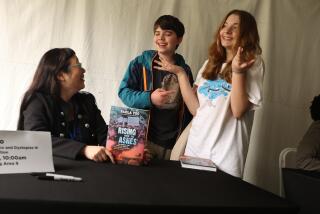Writers Get a Pitching Lesson
There are a million stories in the naked city. The trouble is, few of them ever get published -- and fewer still help pay the rent.
Doing its part to change all of that Sunday was the city of West Hollywood, which dedicated a large part of its second annual book fair to helping out L.A.’s legions of unpublished writers.
While book lovers took in a distinctly Southern California mix of guest authors -- from ex-Dist. Atty. Gil Garcetti to ex-madam Heidi Fleiss -- many aspiring writers were busy scribbling notes on strategy in seminars titled “Writing the Nonfiction Book” and “How to Get a Literary Agent.”
Organizers said the fair was a big improvement over last year’s, thanks to more aggressive marketing and sunnier weather. But the editors, agents and established writers who spent the day doling out advice to fledgling writers offered a dark view of the current publishing scene, which they painted as increasingly cutthroat and oriented to the bottom line, with an obsession with celebrity and blockbusters that rivals the film industry’s.
As a result, agent Ken Sherman explained, the job of a writer has changed: Now even high-minded novelists have to hang up their insecurities and sell, sell, sell.
“You’ve got to find ways of getting out there and promoting yourself,” he told a packed tent full of fledgling writers.
Listening intently was fiction writer Eduardo Santiago, who said Sherman’s comments underscored his experience since completing his first book of short stories about Cubans and Cuban Americans, “The Sex Lives of the Saints.”
Santiago, a 36-year-old resident of Echo Park, said a well-known agent recently asked him if he could round up a few famous fellow authors to “blurb” his book. Santiago always thought that rounding up promotional quotes was the work of publicists.
“I’m hoping the publication of my book will coincide with Castro’s death,” Santiago said with a chuckle. “I don’t mean anyone any ill will ... but I need the publicity.”
The panelists seemed strongest when advising writers on how to interact professionally with representatives of the publishing business. They held forth on the best way to write to an agent, the proper length of writing samples, the best strategies for self-publishing.
When it came to the act of writing itself, things took a turn toward the gnomic.
“A writer is someone who writes,” said a first-time author on Sherman’s panel.
“It’s always about passion,” added agent Babette Sparr.
“The best thing you can do is undergo psychotherapy,” said Scott Smith, author of the book “The Soul of Your Pet: Evidence for the Survival of Animals After Death.” “If you understand yourself, you’re going to be able to understand the ups and downs of the book-writing process.”
In a seminar on fiction writing, author Mary Rakow, who recently published her first novel, “The Memory Room,” told the audience she was wary of people who said their goal in life was to be a writer. A better goal was to make the world a better place.
But writers, including Paul Maher, said they were determined to press on, and said they had found the straight talk heartening. Maher, a Burbank resident, has been collecting material since 1980 for a biography of Walter Lantz, the creator of “Woody Woodpecker” and is determined to get it to a publisher.
“To be able to have the feedback from these people and to be able to talk to them is just incredible,” he said. “It’s like walking into a bookstore and being able to talk to the books.”
More to Read
Sign up for our Book Club newsletter
Get the latest news, events and more from the Los Angeles Times Book Club, and help us get L.A. reading and talking.
You may occasionally receive promotional content from the Los Angeles Times.








